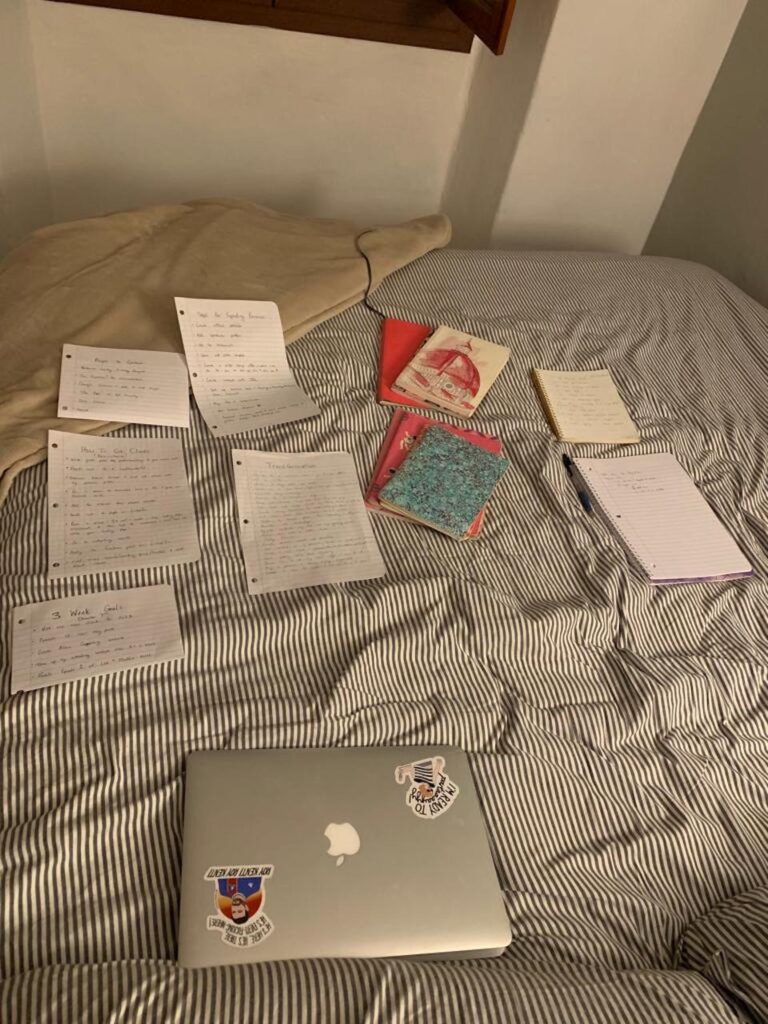In case you haven’t guessed, it’s me. Hi. I’m the girl who hates planning, it’s me.
I’ve always felt like planning and scheduling locked me into a reality with no room for flexibility and spontaneity. To the point where I wouldn’t even write down what I needed to get done. I relied on my trusty, top notch memory to remind me about work assignments and appointments and thanks to my drive to not disappoint, I somehow always managed to get my ish done.
But I was flailing. Wasting a lot of time on social media. And often walking around feeling vaguely like I should be doing something else. I started to realize that all of the resistance I had around planning and getting organized was only holding me back from having more freedom and spontaneity.
It’s a catch 22.
The bizarre truth about planning and organization is that they actually create more free time for you.
Now I know what you’re thinking, “No way Megan, those activities are fun suckers!” That’s what I would have said to myself too. But hear me out.
When we don’t have a plan, we’re living in reactive mode. We tend to focus on what’s urgent or get caught up in immediate responses to things like email, Slack notifications and text messages.
We also have a tendency to waste our own time by not being organized.
Take grocery shopping for example. When you show up without a list and just sort of wing it while getting your supplies, you’re likely going to forget something.
It’s all fun and games until you run out of coffee in the middle of the week – gasp! – which only ends up costing you more time and another trip to the same Piggly Wiggly to get your bag of Joe.
Another example is invitations. If you haven’t scheduled your week in advance, you may end up accepting dinner invites or saying yes to coffee dates when what you really want to do with your free time is see that art exhibition you’ve been talking about for weeks.
If you haven’t blocked off a time and date to go to see the glorious display of art, it will become easier to rsvp to that happy hour your friend is pushing for, which will be fun, but maybe isn’t your top choice for spending that free time.
Are you picking up what I’m putting down? Great.
I’m still learning and refining my planning process with every passing week, but I wanted to share some tips and tricks that I’ve incorporated in spite of my major “planning kills all joy” and “organization?” *eye roll* attitude.
Here’s how to get frickin’ organized already for that girl (me) who loathes structure.
Get a Planner
I know this sounds like a no-brainer, but it’s CRUCIAL in my opinion. Get in your car and drive yourself to a cute stationary store and pick up a real life planner that you can hold in your hands.
I understand that there are some unicorns who can use apps and online tools – like Google Calendar or Evernote – to stay on track, but I will forever be the type of gal who swears by pen and paper.
They say writing things down helps you remember them better and I firmly believe that! If you’d rather order a planner online, I’m linking some of my favorites here, here and here. I look for one that has both a monthly and weekly breakdown and space to write in obligations and to-do’s.


Schedule a Time to Plan Your Week
And make it the same time every week. I’d recommend Sunday evening although Thursday could also be a good time for those people who are all *slams laptop shut until Monday*.
All you really need is about 20 to 30 minutes, a coffee (or wine, I won’t tell on you), and a date with a pen and your planner. This is where the magic of organization starts to take shape.
ALRIGHT. Here’s what you’re going to do.
Block Off Your Have To’s
Write down everything that you know of coming up this week that you HAVE to do. I’m talking about work, if you’re the kind of person who has to be in the office or be online at certain times. Write this in as “Work 8:30 – 5” or however you choose to format it.
Then, within that frame write down any calls or meetings that you have scheduled & what they’re about. Included in this category are any doctors appointments, therapy sessions, or other pre-planned obligations that you have coming up for the week.
I would also put time for necessary errands here like getting groceries, getting gas, and buying other household items that you need to get through the week. You can’t skip those things, so pick out a time to do them now.
This group of HAVE TO’S are the big stones that go into the jar first. This time has to be spent doing these activities and of course, within that time frame (for work for example) it’s up to you to capitalize on your productivity. Don’t worry, sunshine. We’ll get to that.
Read also: The Best YouTubers for Spirituality and Self-Development
Plan Your Goals or Want To’s
ALRIGHT. Next, we need to plan those things that are important to you for your physical and mental health AND the important goals that you’re working to accomplish. I’d classify all of these as your want to’s.
Exercise
First up, exercise. When are you going to work out? Where? For how long? Put those workouts in your planner and block off that time outside of the HAVE TOs that are already scheduled. Boom. You now have a workout plan.
Don’t workout? Now’s the time to start. Put in just ten minutes a day to do something, whether it’s a pilates workout on YouTube or a sassy hot girl walk. Even this small change can dramatically affect your mood.
Morning Routine
Next up, do you already have a morning routine? If not, I’d suggest creating one that sets you up for success during the day.
This can be as simple as meditating for ten minutes in the morning or saying a prayer, or include a number of activities in an hour’s time, like Hal Elrod’s method from The Miracle Morning. He calls them the Life SAVERS and every letter stands for something. You could dedicate 20 minutes to the first three (SAV), 20 to exercise if you want it to be part of your AM routine, and 20 for RS.
- S – Silence (meditation)
- A – Affirmations
- V – Visualization
- E – Exercise
- R – Reading (for the purpose of learning, self-development)
- S – Scribing (journaling)
I personally have played around a lot with the way I structure my mornings because I don’t always like having so many “morning musts” to work through. Right now, my morning routine consists of ten minutes of meditation, ten minutes of journaling, and a thirty minute workout. Easy and effective.
You could do the same for an evening routine if that’s something that interests you more or you’d like to have both.
The Dream
One important part of planning, in my opinion, is carving out time every single day to work towards what you really, truly dream of doing with your life. I know it may not be feasible for everyone, if you have kids or work two jobs right now, but if possible I’d recommend blocking off an hour for this, preferably in the morning before life gets in the way.
Maybe this is starting your own business, mastering a language, or writing a novel. For me, it’s screenwriting. I would always put it on the backburner, squeezing in writing sessions when I could between work and other obligations.
Now, I prioritize it. Every day I set a timer for one hour, turn off my phone and just work on my scripts. Sometimes I don’t get much written. Other times I have to stretch my hands and make a list of carryover ideas to explore the next day.
This is what Dr. Benjamin Hardy refers to focusing on what’s important (to you) instead of what’s urgent (what pays the bills right now). This is how you make massive progress. One hour a day, let’s say for five days a week, is the equivalent of an entire month of 8 hour work days dedicated only to your dream. That’s really powerful.
If you can’t fit in an hour each day, make it 30 minutes. Can’t do 30? Do 20. 10. But put it on your calendar.

Schedule Alone Time & Schedule Social Time
No matter how high energy you are, you’re not an energizer bunny. We all need to make time for some delicious white space on our calendars.
This is another beauty of scheduling ahead of time. You get to plan fun.
You know how you sometimes add “Busy” to your calendar when working at a big company because you know that if you don’t, someone will schedule you for a meeting and you’ll never finish the actual work that you have to do? Well, this is your chance to do that, except you’ll be spending that time regrouping instead of working.
Alone Time
Maybe this is a few days after work, where you simply have nothing planned and your plan is to do whatever you feel like doing. Maybe you write “solo date” and take yourself to a museum, bookshop, or coffeeshop, after work. Maybe this time is for grabbing a book and going to read somewhere sunny. Maybe it’s for your Target run. Alone time deserves a space on your calendar. Once you schedule it, no one can take it away from you (unless you let them).
Social Time
Conversely, we all need time to be with other people and socialize. Set aside time to be with your friends and family or set up dinners/drinks with friends. I feel like at least one outing with friends per week is essential and doable.
If you’ve made plans in advance to go to any concerts, parties, weddings, dinners etc. write those in in advance so that you see them coming up.
I’d recommend scheduling one friend date and one solo date during the working week for your mental health.
Read also: How to Create a Productive Morning Routine
Deep Work Mode
There’s work and then there’s deep work. Work is what we say we’re doing when we’re technically logged in with our email open and working on assignments in between notifications.
Turning off your phone and silencing notifications is the adult equivalent of saying “na na na na na you can’t catch me” but like, in a mature, respectful way. Not only are you honoring yourself by silencing the noise and eliminating the temptation to scroll, you’re also teaching others to be okay without immediate and constant access to you.
This is another topic I’m wildly passionate about. I think we all need to chill out and stop playing instant gratification tag with each other during our work day. No one is gonna die if you take an hour to finish that important assignment without checking email or messaging services. I’m assuming here that you don’t work in an emergency room.
Deep work is a no-nonsense, tunnel vision mentality where Jay-Z and Kanye’s “Who Gon Stop Me,” is the anthem. This is where true productivity comes into play.
Whether you’re employed by a big company or are a freelancer, deep work needs to be a part of every working day.
Within your working day, block off three hours or so to do really deep, concentrated work with NO distractions. You can split this up into three hour chunks or divide it how you please. The important thing is to commit to full concentration during that time.
Micro Plan Every Night
Give yourself just five to ten minutes each night to look at your plan for the next day. Has anything changed? Do you have new calls or meetings to add or anything that got canceled? Make updates to the next day and ensure your schedule reflects any changes that have come up.
Now it’s time for the important things! Every day, you should have no more than THREE important action items. Three tasks that you either complete or work on for a specific length of time.
If you have a major presentation to work on but it isn’t something you can finish in one day, plan it as a priority. During this time, you set a timer for 1 hour, turn off your phone, and just hack away at it. That’s deep work baby. When the timer goes off, you go take a ten minute break and then repeat.
Here’s an example of what your micro plan for the next day might look like:
1. Presentation Research – 2 hours
- Deep work. This could be split into two chunks with a timer.
2. Newsletter Copy
- Let’s say this is something you have to do and can easily finish in a day. You don’t need to put a time here but I’d still suggest deep work mode and setting a timer for an hour at a time to work on it until it’s done.
3. Catch up on Emails
- This should be the easiest of the three priorities of the day. It won’t always be the case, but for emails you don’t need to be in deep work mode. You can even put on some music and relax a bit when you get to this task.
Give Yourself a Score for the Week
One idea for getting into the groove of planning and being disciplined enough to follow through is to give yourself a score, from 1 to 10, for every week. The score is more about whether you felt organized and honored the commitments you made, not how much you accomplished.
It could be useful to reflect on what worked, what didn’t, and why. Did you feel like you overscheduled yourself? Are you not vibing with your morning routine? Did you skip making your micro plan for a few days? Give yourself a score without being hard on yourself and try to use it as information going forward.
The goal with planning is to help yourself feel prepared, make good decisions with your time, and ultimately feel happier and more successful. There’s no right way to do it. Or rather, the right way, is whatever works for you.
Go get ‘em tiger.
Read more: Rewiring Your Identity in 10 Minutes a Day
Disclaimer: This post may contain affiliate links on which I’d earn a small commission at no additional cost to you. All opinions are 100% my own.





